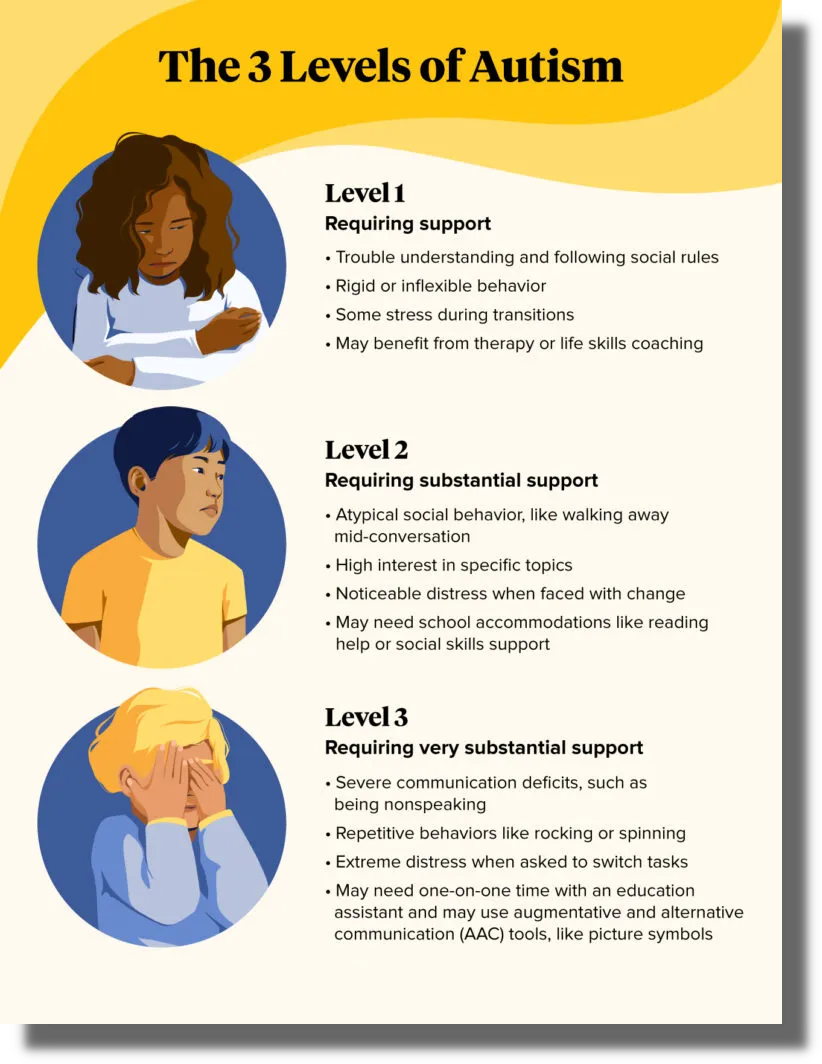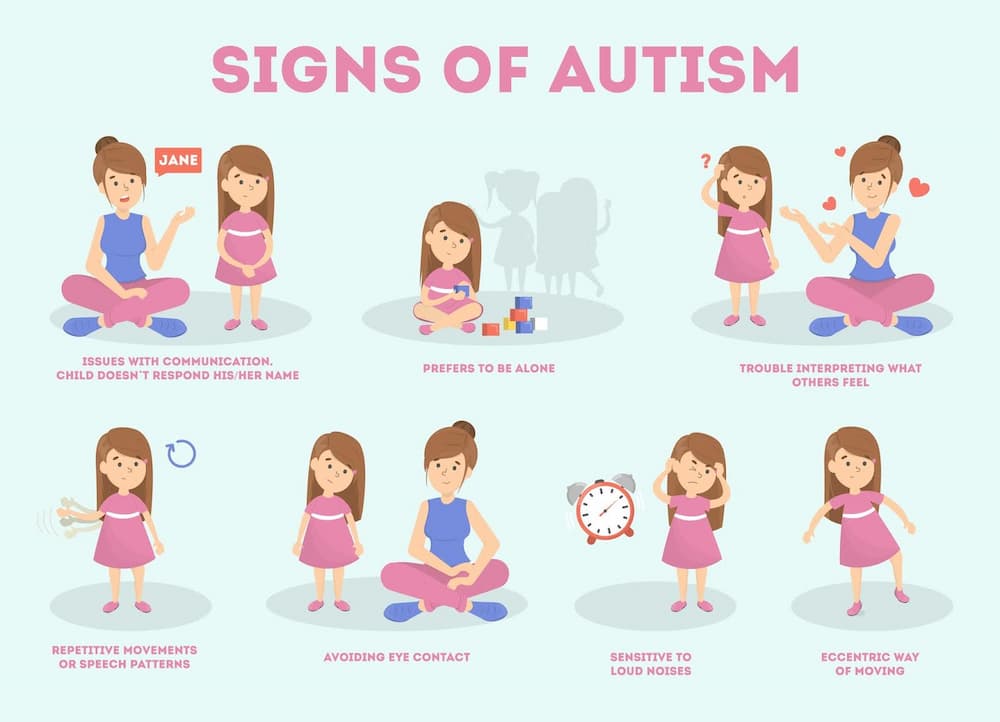Secret Signs and Signs to Acknowledge in People With Behavioral Autism
When you experience somebody with behavioral autism, recognizing vital indications and symptoms is essential. Furthermore, sensory sensitivities can lead to overwhelming experiences.
Obstacles in Social Communications
When you engage with somebody on the autism spectrum, you may discover they struggle with social cues and communication. These difficulties can make social communications really feel overwhelming for them. You may see them avoiding eye get in touch with or standing also close or also away throughout conversations, which can develop misunderstandings. They could not notice body language or facial expressions, making it harder for them to gauge how others are feeling.
In addition, you may locate that they like regimens and acquainted setups, which can restrict their readiness to participate in new social circumstances. When they do involve, they may chat regarding their rate of interests in fantastic detail without observing if you're interested. This can lead to one-sided discussions that leave you really feeling detached. Recognizing these challenges can aid you approach communications with empathy and perseverance, promoting a much more comfy atmosphere for both of you.
Difficulty With Verbal and Non-Verbal Interaction

Non-verbal communication can be also extra difficult. You could see an absence of eye get in touch with or restricted use motions, which can make communications feel unpleasant. Face expressions might not always line up with the discussion, bring about confusion regarding their feelings. Acknowledging these indicators is essential, as it aids you far better support and involve with people on the autism spectrum. By understanding their interaction obstacles, you can cultivate a lot more purposeful connections and offer a more helpful environment.
Repetitive Behaviors and Regimens
Communication challenges typically come with other indications of autism, such as repetitive actions and a strong choice for regimens. You could discover that individuals with autism typically involve in specific, repetitive actions, like hand-flapping, rocking, or duplicating expressions. These actions can give convenience and a sense of control in a commonly frustrating globe.
Routines are similarly crucial; numerous people flourish when they adhere to a structured schedule. You might locate that changes to these routines can lead to significant distress. As an example, if they have a day-to-day ritual of consuming breakfast at a specific time or following a specific course to institution, any disturbance can create stress and anxiety.
Identifying these patterns aids you comprehend their habits and provide assistance. By accommodating their requirement for routine and allowing repetitive actions, you can create a more comfortable atmosphere that eases their difficulties.
Sensory Sensitivities

Common Sensory Triggers
Sensory level of sensitivities can significantly impact day-to-day live for individuals with autism, as specific stimuli frequently cause overwhelming responses. Typical sensory triggers consist of loud sounds, intense lights, and strong smells. You may see that unexpected noises, like alarms or alarms, trigger anxiety or distress. Fluorescent illumination in shops can feel severe and uncomfortable. Appearances can also play a considerable duty; rough materials or particular food appearances might be excruciating for you. Furthermore, crowded places can overwhelm your detects, making it tough to focus or unwind. Understanding these triggers can aid you manage useful reference your environment better. By recognizing what influences you, you can take steps to minimize pain and enhance your day-to-day experiences.
Behavior Reactions Explained
Recognizing your behavioral reactions to sensory level of sensitivities is crucial, as they frequently reveal how you communicate with the globe. You may additionally locate on your own looking for details sensory experiences, like deep stress or silent settings, to help ground yourself. Acknowledging these patterns assists you understand your needs far better and can assist just how you communicate them to others.
Coping Techniques Summary
Identifying your sensory sensitivities is simply the very first action; now it's time to check out coping approaches that can aid you handle those experiences successfully. Begin by developing a sensory toolkit tailored to your needs. This can include noise-canceling earphones, fidget toys, or soothing fragrances. Establishing an organized regimen can also offer predictability, minimizing anxiousness around sensory overload. Take breaks in a peaceful area to collect yourself when you really feel overloaded. Practicing mindfulness strategies like deep breathing can aid ground you in the moment. Furthermore, interact your demands with those around you; having supportive loved ones can make a huge difference. Remember, discovering what functions best for you may take some time, so be patient and open to trying new strategies.
Restricted Passions and Emphasis
While lots of individuals establish a wide variety of passions, those with autism usually demonstrate limited rate of interests and an intense emphasis on specific subjects. You might observe that a person with autism can spend hours diving into their preferred subject, whether it's a specific sort of train, a certain film, or a clinical idea. This intense emphasis isn't simply a pastime; it can end up being a central component of their identification and social communications.
You may discover that discussions rotate around these rate of interests, and they might battle to engage in more comprehensive topics. By comprehending and recognizing these limited interests, you can promote an encouraging atmosphere where they really feel valued and recognized, permitting for more significant links and communications.
Emotional Regulation Troubles
People with autism commonly deal with difficulties in psychological policy, which can be influenced by their extreme focus on certain rate of interests. You could see that when a person is deeply engaged in a recommended activity, they can experience solid feelings, whether enjoyment or aggravation. This intensity occasionally makes it hard for them to change gears or manage their feelings when points do not go as planned.

Irregularity in Developing Landmarks
When it comes to developing turning points, you'll discover that people with autism typically show a large range of variability. Some may strike landmarks on time, while others could lag behind or development at a different pace. As an example, you may see a child master language abilities but fight with social interactions. This disparity can be complicated, as typical standards don't always use.
It's vital to recognize that each individual's journey is special. Observing these patterns can assist you comprehend their staminas and needs better.
Regularly Asked Inquiries
Just How Is Autism Detected in Children and Grownups?
To identify autism in grownups and kids, specialists review actions, find out interaction abilities, and social communications. They usually make use of standardized examinations, interviews, and monitorings to determine if a private satisfies the criteria for autism range disorder.
Are There Different Kinds Of Autism Range Disorders?
Yes, there are various kinds of autism spectrum official website conditions, including Asperger's disorder and prevalent developing disorder-not otherwise specified. Each kind varies in severity and qualities, so understanding these differences can help you better support people with autism.
What Therapies Work for People With Autism?
When thinking about effective treatments for people with autism, you'll locate choices like Applied Behavior Evaluation, speech therapy, and occupational treatment. Each technique can help improve communication, social skills, and day-to-day operating tailored to individual demands.
Can People With Autism Lead Independent Lives?
Yes, individuals with autism can lead independent lives. With the appropriate assistance, skills training, and resources, you can assist them develop self-sufficiency, handle daily tasks, and flourish in various atmospheres, cultivating their freedom.
Just How Can Households Support Loved Ones With Autism?
You can support your loved ones with autism by producing a structured setting, urging their passions, exercising patience, cultivating communication, and advertising social skills. Commemorate their success, no matter how small, and develop an encouraging neighborhood.
Although numerous individuals on the autism spectrum can comprehend and use language, they typically deal with considerable difficulties with both verbal and non-verbal interaction. Identifying these indications is important, as it aids you far better support and engage with people on the autism range. You might notice that individuals with autism typically involve in particular, repetitive actions, like hand-flapping, shaking, or duplicating expressions.Sensory level of sensitivities can considerably affect everyday life for people with autism, as certain stimulations frequently cause overwhelming responses.When it comes to developing milestones, you'll see that individuals with autism frequently reveal a broad range of variability.